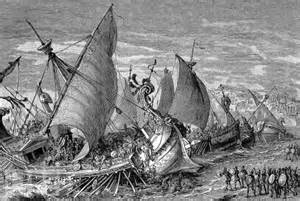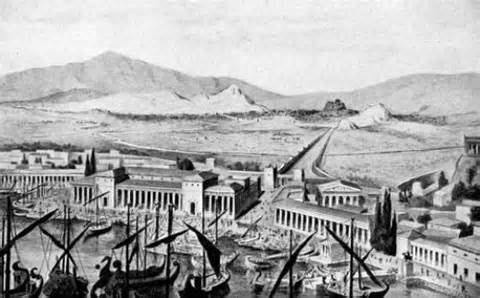The Peloponnesian War
Part 3: All Fall Down
Four years later, Athens sent forces to the aid of another ally, in Sicily. Not content to rescue the ally, Athens set its sights on conquering the largest city on the island, Syracuse. Athens sent 100 ships and 5,000 troops, along with a small contingent of cavalry. When they arrived, late in the year, they did little fighting, preferring to wait until spring. During the winter, Syracuse was successful in securing Spartan support. The result was another battle between Athens and Sparta, and the result was a disastrous defeat for Athens. Sparta again sent troops into Athenian territory, disrupting supply lines and production at the surrounding silver mines. In this instance, also, Spartan forces freed thousands of Athenian slaves. (It isn't often mentioned in historical texts, but slave labor was very much the backbone of economic society in Ancient Greece.) Rather than take up residence behind the walls again, Athens doubled down on their Sicilian gambit, sending another 100 ships and another 5,000 troops. The result was even more of a victory for Spartan and Sicilian forces. As a result, Athens, running short of money, demanded even more tribute from the members of its empire, encouraging more city-states and colonies to consider revolting. At this time, Sparta also accepted an alliance with Persian forces, who were only too ready to fight against Athens. However, in what was to prove a prime reason for the prolongation of the war, Persian forces and funds proved slow in getting to the front and the alliance. Nonetheless, the Athenians still had reserves of ships and money, which they used to good effect in the next few years, turning what looked to be a certain defeat into a delaying action. Athens at this time had turned into an oligarchy, just like Sparta, and had appointed Alcibiades to lead its forces. Victories over Spartan forces at the Battle of Syme in 411 and at Cyzicus in 410 were the first of a series of Athenian successes and allowed Athens to recapture large parts of its empire. Like the Persians, the forces of Corinth and Syracuse proved slow to Athenian victories continued into 406, with a major confrontation at Arginusae. One exception was a minor Spartan victory at Notium, engineered by the Spartan general Lysander. In the next two years, Lysander also engineered the end of the war. He benefited vicariously by an untimely demotion of several top Athenian generals. He also seized the initiative by bottling up Athens' grain supply line, in the Hellespont. The Athenian fleet followed; and Lysander, a keen naval strategist, outmaneuvered and outfought his Athenian counterparts, scoring a knockout blow at the Battle of Aegospotami, in 405. Of the 180 Athenian ships on hand, Lysander's forces destroyed 168, capturing 3,000 sailors as well. The next year, its fleet destroyed, its supply of grain and silver cut off, its coffers empty, Athens surrendered. The Peloponnesian War officially ended in 404 B.C. Sparta did not take extreme vengeance on Athens, preferring to incorporate the large city-state into the Peloponnesian League. The Long Walls, however, were dismantled and the fleet capped at a paltry 12 ships. The war had weakened the two large city-states, making them slow to rebuild and slow to react to new challenges. Corinth stepped into the vacuum and became the most powerful Greek city-state for awhile. Thebes enjoyed dominant status for awhile as well, including a major victory over Sparta in 371. The long-term effect of the war between Athenian forces and Spartan forces, however, was to weaken the entire Greek world, making it easier for one Philip II of Macedon, and later his son Alexander, to establish Macedonian rule. First page > Siege and Intrigue > Page 1, 2, 3 |
|
Social Studies for Kids
copyright 2002–2026
David White



 Fighting between the two majors had stopped, but intrigue among the smaller city-states did not. Argos, a powerful Peloponnesian state that was not part of Sparta's sphere of influence, found some like-minded city-states and attempted to take over the city of Tegea, not far from Sparta. As it happened, Athens was involved after all, in the form of a small force led by famed general Alcibiades. The resulting fighting, the Battle of Mantinea, was, many historians report, the largest land battle fought on Greek soil during the entire war. Spartan and Tegean forces routed the invaders, in 418.
Fighting between the two majors had stopped, but intrigue among the smaller city-states did not. Argos, a powerful Peloponnesian state that was not part of Sparta's sphere of influence, found some like-minded city-states and attempted to take over the city of Tegea, not far from Sparta. As it happened, Athens was involved after all, in the form of a small force led by famed general Alcibiades. The resulting fighting, the Battle of Mantinea, was, many historians report, the largest land battle fought on Greek soil during the entire war. Spartan and Tegean forces routed the invaders, in 418. move into anything but a defensive posture; and when Sparta wanted to take the battle into the Aegean, it found itself largely unsupported.
move into anything but a defensive posture; and when Sparta wanted to take the battle into the Aegean, it found itself largely unsupported.
